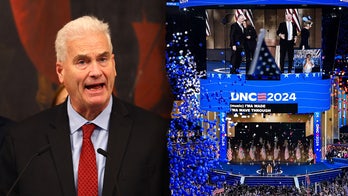When the president of the United States takes time to denounce a single bill in a state legislature as an “assault on unions,” one might be forgiven for thinking it contains some groundbreaking stuff.
But, in fact, the controversial plan in Wisconsin and similar legislation in Ohio, Tennessee and elsewhere would in many ways treat state workers the same as employees of the federal government.
For all of the thunder we’ve heard from the president and his party about union busting, what’s been proposed is more akin to bringing the federal standard to the state level.
The Republican plan for states has two key elements.
First, government worker unions would lose the power of collective bargaining for benefits and work rules. Pay rates could still be bargained for, but in Wisconsin, anything beyond cost-of-living increases would go before state voters in a referendum.
The lack of collective bargaining power hasn’t put much of a damper on federal compensation. Federal workers out-earned their private-sector counterparts in the same jobs by an average of more than $7,000 according to a USA Today report. And on benefits, federal workers brought in, on average, over $30,000 more than those not employed by the feds -- $40,785 vs. $9,882.
Second, state agencies could no longer be “union shops.”
In Wisconsin and many other states with collective bargaining for government workers, state employees have no choice as to whether or not to join a union. If a majority of workers has ever voted to organize an agency, everyone in the section is shoved into the union. The state then automatically docks workers’ paychecks for union dues, which are then handed over to labor leaders.
Under the new Republican model, states would function as the federal government does when it comes to union membership. A union that had successfully organized a section of the government would represent all the workers, but dues and official membership would be strictly voluntary.
Studies suggest that most federal workers who are represented by unions don’t pay dues. And since unions give almost entirely to Democrats, that means the lack of dues payments from the federal payroll – now more than $15 billion a month for nearly 3 million employees – leaves a lot of campaign cash on the table.
To help federal unions fulfill their mandates with so many workers opting not to pay dues, the government actually pays union leaders’ salaries. In a practice known as “official time” the shop stewards and labor leaders of federal unions get taxpayer money to do union business.
Unions are constantly battling for more “official time,” with the aim of increasing the number of workers who work on union business 100 percent of the time. While this helps unions organize and extend their reach into the federal workforce, it doesn’t provide cash that can be used to help elect sympathetic members of Congress.
Much of the work of the agency charged with resolving disputes between labor groups and the federal government – the Federal Service Impasses Panel – is devoted to union requests for more “official time.”
The panel also sorts out disputes over dress code requirements, access to smoking lounges and the location of union officials’ federal office space. A look at the docket for the panel suggests that few issues are too small to end up as a labor dispute, including the acceptability of “skorts” – shorts that look like skirts – for women who work in federal offices with dress codes.
Suffice it to say that a lack of collective bargaining power has not much impaired the access of federal workers to the grievance process. So why are Democrats so wound up over the state-level proposals? Why would the Obama administration and campaign organization be pushing so hard on a proposal to treat state and federal workers alike?
The idea to stop mandatory union membership and automatic dues payments is understandably alarming to the Democratic state senators who fled Wisconsin in order to shut down the legislature. The Milwaukee Journal Sentinel found that a fifth of all campaign donations to the fugitive lawmakers in the past two election cycles came from public workers.
For national Democrats, the stakes are just as high. The more than 2 million civilian federal workers available for union organization are small fry compared to what’s going on at the state and local level.
The Census Bureau says that in 2009, there were 3.8 million state employees and 11.1 million local government employees. And while some states and local government unions don’t get mandatory membership and dues payments from workers, many do. If the Wisconsin movement takes hold, Democrats could lose out on tens of millions of dollars in campaign contributions over the next two election cycles.
With private-sector unions continuing to wither, public sector labor groups now constitute the core of the Democratic coalition.
Given the political benefits obtained by Democrats from public workers and the fact that what Barack Obama denounced as “an assault” looks a lot like the system he oversees as president suggests some deep cynicism from his party in the battle of Wisconsin.
Chris Stirewalt is FOX News’ digital politics editor. His political note, Power Play, is available every weekday morning at FOXNEWS.COM.











































